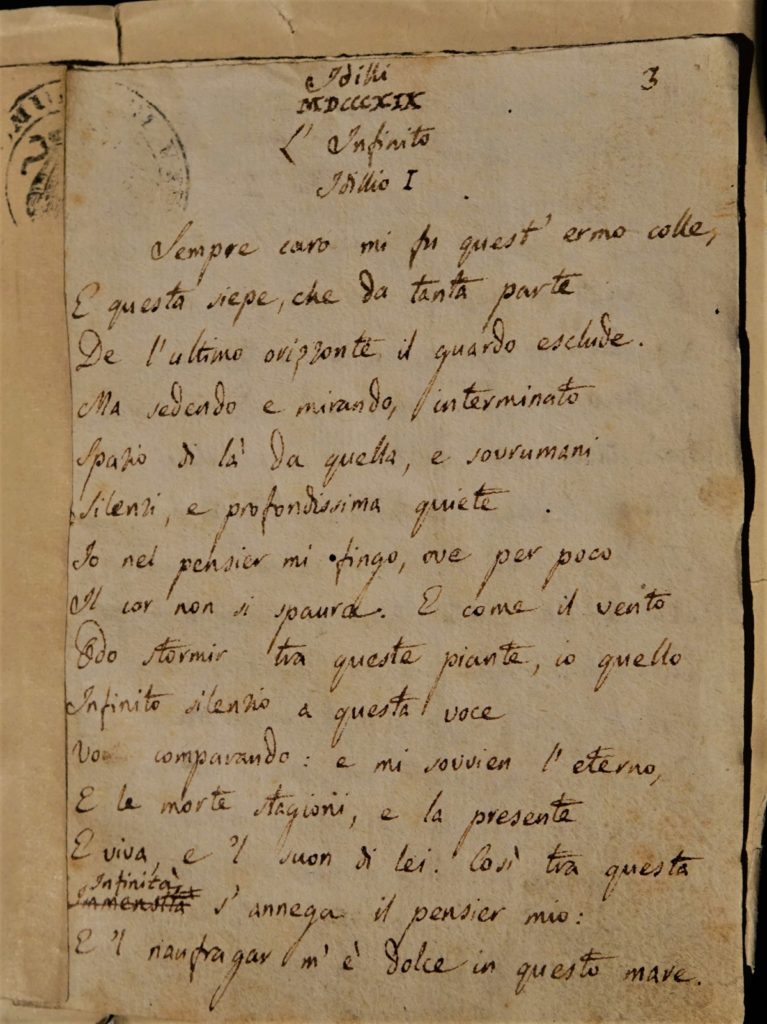Giacomo Leopardi L’infinito
Translated by Steven J. Willett

This is the original manuscript of L’infinito written in 1818 when the poet was 22.
Note: While the poem can be given a highly negative interpretation, I think this is a distorted view of the climax with its use of the untranslatable metaphor “al naufrago.” It has always seemed to me since I read the poem in my teens to be an immersion into infinite consciousness. That of course can, as anyone who has long practiced Zazen (座禅 ‘seated meditation’), be an initial sense of fear. It soon vanishes into complete unity.
Always was dear to me this lonely hill,
And this hedge, that from so large a stretch
Of the extreme horizon excludes the view.
But sitting here and gazing, interminate
Spaces far beyond that, superhuman
Silences, and the profoundest quiet
I fashion in my thought; where nearly
The heart is not afraid. And as the wind
I hear blustering among these branches, that
Infinite silence with this voice of wind
Comparing: and the eternal comes to mind,
And the mortal seasons, and the present one
That lives, and the sound of it. Thus in this
Immensity my mind sinks down to drown:
And sweet to me is foundering in this sea.
L’infinito
Sempre caro mi fu quest’ermo colle,
E questa siepe, che da tanta parte
Dell’ultimo orizzonte il guardo esclude.
Ma sedendo e mirando, interminati
Spazi di là da quella, e sovrumani
Silenzi, e profondissima quiete
Io nel pensier mi fingo; ove per poco
Il cor non si spaura. E come il vento
Odo stormir tra queste piante, io quello
Infinito silenzio a questa voce
Vo comparando: e mi sovvien l’eterno,
E le morte stagioni, e la presente
E viva, e il suon di lei. Così tra questa
Immensità s’annega il pensier mio:
E il naufragar m’è dolce in questo mare.

Very fine translation. Thank you. The following is work I work in the 1990s, loosely based on Leopardi’s poem:
Capitulation
(After Leopardi)
You countless stars, often have I stood gazing at your cast of lights, clustering you in figures, or fathoming the awful quiet of the expanding space in which you move, until my thoughts grew weary of number, distance and perspective and clear of the relations on which these solitude’s depended: Then would I fashion an escape, moving through surreal lands, weird and apprehensive, I turned to you for points-of-reference, dependent on experience to interpret the apparent constancy of elements which carry me and the vague end towards which I move, enthralled by the freedom of these jests and the consciousness that my motives were founded on the excited rhythms and cleverness of the spurious tautologies I had to maintain to keep myself suspended above a yawning void searching for your lights as the resilient present with its persuasive noise recalled me to my life and times.
A lovely poem and a joy to read. I would wholeheartedly support the interpretation that a blissful state of oblivion is being described.
thank you for post.great stuff.especially the wind analogy
when the north wind blows
I am going to sail away
I will be back some day
who knows
raise my sails up high
set my compass true north
the high seas i will ply
for what its worth
wander through valley and hill
grass is greener over there
I have certainly paid the bill
for a breath of fresh air
I will pack a cucumber sandwich
might take a thermos of tea
could stop over in Ipswich
At quarter past three
time has flown by
it has been a blur
but I still try
to capture the allure
my advice to you my friend
do it while you can
just press send
before it peters out the pan.